2017年中考英语攀枝花真题
2017攀枝花中考英语练习试题及解析

2017攀枝花中考英语练习真题一、听力部分(每题1分,共25分)(一) 听句子,选择适当答语。
每个句子听两遍。
(5分)1. A. I know. B. Yes, I do. C. With pleasure.2. A. No, I don’t. B. Sorry, I won’t. C. That’s right.3. A. Thank you. B. Not at all. C. Don’t say so.4. A. What a pity! B. Good ide a! C. Don’t mention it!5. A. I enjoy it. B. No problem. C. I don’t think so.(二) 听对话,选择符合对话内容的图片。
每段对话听两遍。
(5分)6. Where are the man going next holiday?A. B. C.7. What’s Anna’s favorite exercise?A.B.C.8. What is the boy doing?A.B.C.9. Which vegetable does Silly’s mother like best ?A.B.C.10. What’s John’s favorites subject?A. B. C.(三) 听下面两段对话,根据内容选择每个问题的最佳答案。
对话和问题听两遍。
(5分)听第一段对话,回答第11—12小题。
11. How often does the bus run on Saturday?A. Once an hour.B. Twice an hour.C. Three times an hour.12. How far is the school from here?A. About 5 miles.B. About 15 miles.C. About 25 miles.听第二段对话,回答第13—15小题。
四川省乐山市2017年中考英语试卷及答案(中考真题)
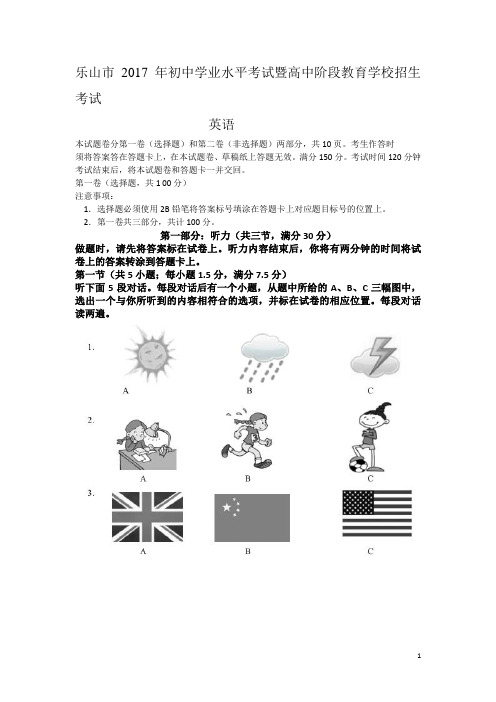
乐山市2017年初中学业水平考试暨高中阶段教育学校招生考试英语本试题卷分第一卷(选择题)和第二卷(非选择题)两部分,共10页。
考生作答时须将答案答在答题卡上,在本试题卷、草稿纸上答题无效。
满分150分。
考试时间120分钟考试结束后,将本试题卷和答题卡一并交回。
第一卷(选择题,共1 00分)注意事项:1.选择题必须使用2B铅笔将答案标号填涂在答题卡上对应题目标号的位置上。
2.第一卷共三部分,共计100分。
第一部分:听力(共三节,满分30分)做题时,请先将答案标在试卷上。
听力内容结束后,你将有两分钟的时间将试卷上的答案转涂到答题卡上。
第一节(共5小题;每小题1.5分,满分7.5分)听下面5段对话。
每段对话后有一个小题,从题中所给的A、B、C三幅图中,选出一个与你所听到的内容相符合的选项,并标在试卷的相应位置。
每段对话读两遍。
第二节(共5小题;每小题1.5分,满分7.5分)听下面5段对话。
每段对话后有一个小题,从题中所给的A、B、C三个选项中选出最佳选项,并标在试卷的相应位置。
每段对话读两遍。
6. What are they talking about?A. Where to stay.B.What to eat.C.How to play.7. Which month ofthe year is this?A. July.B.April.C.November.8. What kind of music is Helen's favourite?A. Country music.B.Pop music.C.Jazz.9. How old do you think the two speakers are?A. About sixty.B.About forty.C. About twenty.10. What does the woman want to know?A. How much money the man makes.B. What the man usually does after work.C. What the man does with most ofhis money.第三节(共10小题;每小题1.5分,满分15贫)听下面3段对话或独白。
2017年浙江省各地市中考英语试题及答案(8份)
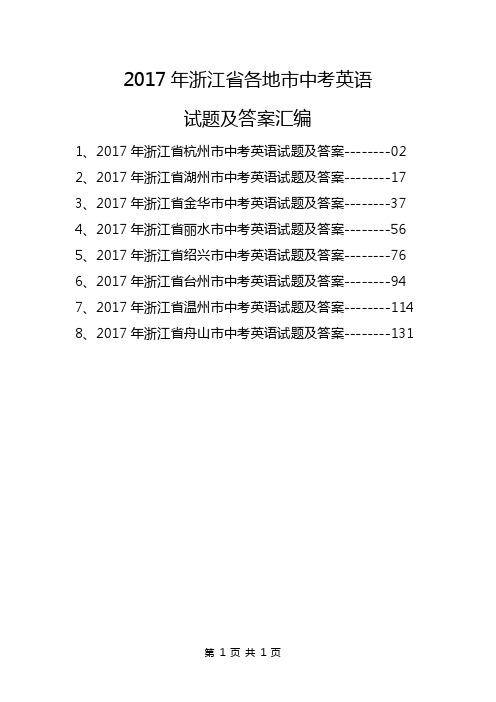
2017年浙江省各地市中考英语试题及答案汇编1、2017年浙江省杭州市中考英语试题及答案--------022、2017年浙江省湖州市中考英语试题及答案--------173、2017年浙江省金华市中考英语试题及答案--------374、2017年浙江省丽水市中考英语试题及答案--------565、2017年浙江省绍兴市中考英语试题及答案--------766、2017年浙江省台州市中考英语试题及答案--------947、2017年浙江省温州市中考英语试题及答案--------1148、2017年浙江省舟山市中考英语试题及答案--------1311.杭州市2017年中考英语试题及答案(原卷版)考生须知:1.本试卷满分为120分,考试时问为100分钟。
2.答题前,在答题纸的指定位置上填写有关信息。
3.所有答案必须填涂在答题纸标定的位置上,务必注意试题序号和答题序号相互对应。
4.考试结束后,试题卷和答题纸一并上交。
5.听力部分答题时请先将答案标在试卷上,录音内容结束后,你将有一分钟的时间将答案转涂到答题纸上。
试题卷第I卷第一部分听力(共两节,满分30分)第一节(共5小题,每小题2分,满分10分)听下面5段对话,每段对话后有一个小题。
从题中所给的A、B、C三个选项中选出最佳选项,并标在试卷的相应位置,听完每段对话后,你都有10秒钟的时间来回答有关小题和阅读下一小题。
每段对话仅读一遍1.what is the woman looking for?A. Her phone.B. Her desk.C. Her dictionary.2.What is the man doing?A. Shopping online.B. Watching videos.C. Fixing the computer.3.How did the woman go around San Francisco?A. By car.B. By train.C. By taxi.4.Where is the museum?A. On New Street.B. At the first crossing.C. Opposite the library5.Why couldn’t Sandy get the books?A. Because he was too busy to go to the bookstore.B. Because the bookstore closed before hearrived.C. Because the books were sold out before he arrived.第二节(共10小题,每小题2分,满分20分)听下面3段对话或独白。
中考英语题组训练3 根据首字母提示及文意补全短文

题组训练3 根据首字母提示及文意补全短文阅读下面的短文,根据短文内容及首字母提示,在短文空白处填入一个恰当的词,使短文内容完整、通顺。
A[2017·襄阳]Life will be peaceful if you always do kind things. I teach my daughters to 1.d________ a habit of helping others.We live in a rural(乡村) area. Most of what we see is beautiful nature. One of the exceptions(例外) to the beauty is the rubbish that some people throw out of their car windows. And there are no necessary public 2.s________,such as rubbish collection.A helping behavior(举动) that I often 3.p________ with my daughters is picking up rubbish in our neighborhood. My daughters often have a 4.m________ to see who can collect the most rubbish. They will often say to me in an excited voice, “There's some rubbish, —Daddy, stop the car!” Without 5.t________ more, we will often get out of our car and pick it up. Though it may seem 6.s________,we do it. In fact, we enjoy it. We pick up rubbish in parks, on sidewalks, almost 7.a________.One day I saw a man I had never met before picking up rubbish on the road. I stopped. He 8.r________ his head and said to me with a smile, “I saw you doing this with your family. It's a good idea to protect our natural world.”There are many other ways to 9.p________ kindness for others. You may share a dinner with a beggar(乞丐), visit lonely old people in the nursing home or help the blind cross the street. You can think of something that can be finished 10.e________ but helpful. It is fun, self-satisfying, and what's more, it can set a good example. Helping others is helping yourself.BSummer was coming and getting hotter. Mrs. King 1.g________ up early one morning and went to the market after she had breakfast. She knew that everything was cheap there 2.b________ eight o'clock. She wanted to buy many vegetables for her family. Suddenly she saw there were a lot of people around a farmer. She hurried there and 3.f________ that he was selling beef.“How 4.m________ is it?” a woman asked.“Two dollars a kilo.”“Oh, how cheap it is!” Mrs. King said to 5.h________. “John likes beef very much. I'd better buy some here.”When she got home with five kilos of beef, her son was happy but her husband got 6.a________. “What a silly woman!” said Mr. King. “How shall we keep it 7.f________ in such hot weather?”“Your aunt is very rich,” said Mrs. King. “Why not g o and 8.b________ some money from her? Then we'll be able to buy a fridge.” Mr. King 9.a________ and they began to teach their five-year-old son what to say when they were in his aunt's house.“John,” Mr. King said, “How can we keep the beef fresh?”“That's easy,” the boy said 10.h________. “By eating it!”C[2017·攀枝花]The Clever Learning MethodsWhy do you need study skills? Because they will make it 1.e________ for you to learn and do well in class, especially asyou move up to middle school and high school.◆Pay attention in classDo you have 2.d________ paying attention in class? Are you sitting next to a loud person? Is it hard to see the blackboard? Make sure you're sitting in a good seat that makes you pay attention. Tell your teacher or parents about any problem that is stopping you from paying attention and taking good notes.◆Take good notesNot sure how to take notes? Start by writing down facts that your teacher mentions 3.o________ writes on the blackboard in class. Try your best to use good handwriting so that you can read your notes later. It's also a good idea to keep your notes, quizzes, and papers 4.o________ by subject.◆Plan 5.b________ testsIt's not wise of you to wait until 6.T________ night to study for Friday's test. It also makes it hard to do your best. You'll feel sorry for 7.p________ off things often. One of the best ways is to plan ahead.◆Get a good night's sleepSo the test is tomorrow and you've followed your study plan, but 8.s________ you can't remember anything, not even 2+2! Don't worry. Your brain needs time to digest(消化) all the 9.i________ you've given it. Try to get a good night's sleep and you'll be 10.s________ by what comes back to you in the morning!参考答案A【主旨大意】本文是一篇记叙文。
云南省2017年中考英语试题(word版含解析)
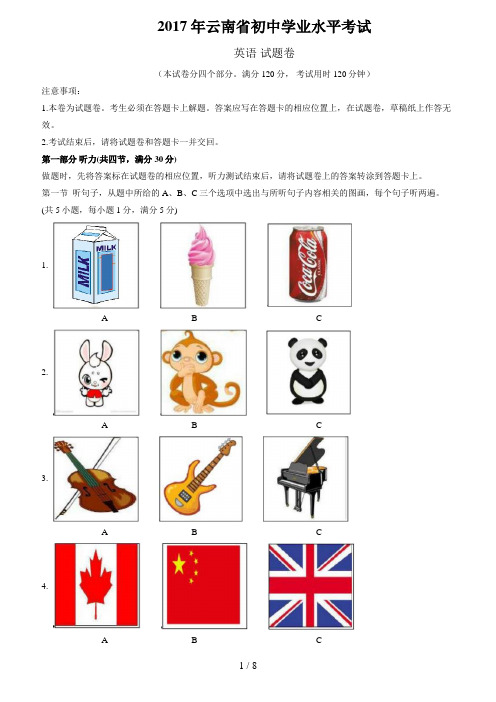
2017年云南省初中学业水平考试英语试题卷(本试卷分四个部分。
满分120分,考试用时120分钟)注意事项:1.本卷为试题卷。
考生必须在答题卡上解题。
答案应写在答题卡的相应位置上,在试题卷,草稿纸上作答无效。
2.考试结束后,请将试题卷和答题卡一并交回。
第一部分听力(共四节,满分30分)做题时,先将答案标在试题卷的相应位置,听力测试结束后,请将试题卷上的答案转涂到答题卡上。
第一节听句子,从题中所给的A、B、C三个选项中选出与所听句子内容相关的图画,每个句子听两遍。
(共5小题,每小题1分,满分5分)1.A B C2.A B C3.A B C4.A B C5.A B C第二节听句子,从题中所给的A、B、C三个选项中选出与所听句子内容相符的正确答语,每个句子听两遍。
(共5小题,每小题1分,满分5分)6.A.Yes, he does . B.Yes, he did. C.Yes, he has.7.A.That’s all right. B.It doesn’t matter. C.I stayed up late.8.A.Congratulations. B.Thank you! C.Here you are.9.A.He is working. B.He is friendly. C.He is a policeman.10.A.I don’t like it. B.Help yourself. C.It’s very kind of you.第三节听对话,从题中所给的A、B、C三个选项中选出能回答问题的正确选项,每段对话听两遍。
(共5小题,每小题2分,满分10分)听第一段对话, 回答第11、12小题。
11.When du they meet?A.In the morning.B.At noon.C.In the afternoon.12.What are they going to do?A.Play games.B.Have a math class.C.In the afternoon.听第二段对话, 回答第13~15小题。
攀枝花中考英语试题-中考.doc
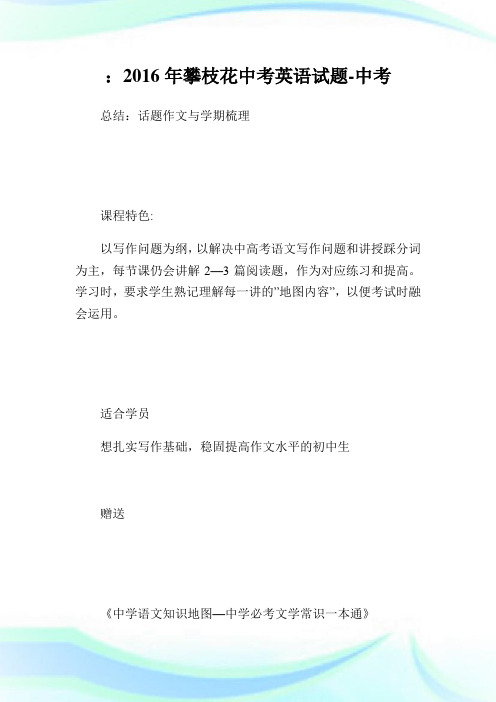
:2016年攀枝花中考英语试题-中考总结:话题作文与学期梳理课程特色:以写作问题为纲,以解决中高考语文写作问题和讲授踩分词为主,每节课仍会讲解2—3篇阅读题,作为对应练习和提高。
学习时,要求学生熟记理解每一讲的”地图内容”,以便考试时融会运用。
适合学员想扎实写作基础,稳固提高作文水平的初中生赠送《中学语文知识地图—中学必考文学常识一本通》第十五章:学期课程融汇与升华课程特色:以解决阅读问题为纲,融会踩分词和阅读答题要求,进行专题训练,侧重点分为两个方面,一是结合《中学语文知识地图踩分词》进行阅读答题运用,二是答题结构与题型,每节课中以阅读概括能力、理解表述能力、判定分析能力和鉴赏能力题为引导进行学习。
适合学员现代文阅读答题技巧掌握不够全面,想稳固提高的初中生赠送《中学语文知识地图—中学文言文必考140字》课程特色:全面地检测与分析学生考试丢分的问题,让学生清楚自己问题在哪,并且怎样改,通过思维训练,加以解决,重点教会学生如何凭借一张知识地图,去解决所有的语文阅读写作问题。
适合学员想夯实语文基础知识,成绩稳步提高的初中生赠送《学生优秀作品及点评指导(2.0版)》第八章:以小见大与虚实相应课程特色:对考场三大作文类型悉数讲解,针对考场作文,黄保余老师现场充精彩点评得失。
适合学员作文写作水平寻求短期突破的初中生赠送《中学考场作文训练营》(图书)第八章:以小见大与虚实相应课程特色:对考场三大作文类型悉数讲解,针对考场作文,黄保余老师现场充精彩点评得失。
适合学员作文写作水平寻求短期突破的初中生赠送《中学考场作文训练营》(图书)课程特色:针对小学阶段学生最应该掌握的三种阅读考试能力进行讲解。
该课程两个重心:一是各类题型答题方法和技巧的分析,特别是易错点的点评;另一个方面是对概括能力、理解能力,表述能力的训练。
适合学员阅读能力迅速提升的5—7级学生赠送《语文阅读得高分策略与技巧》(小学版)课程特色:针对小学阶段学生最应该掌握的三种阅读考试能力进行讲解。
中考英语短文填空03 根据首字母提示及文意补全短文
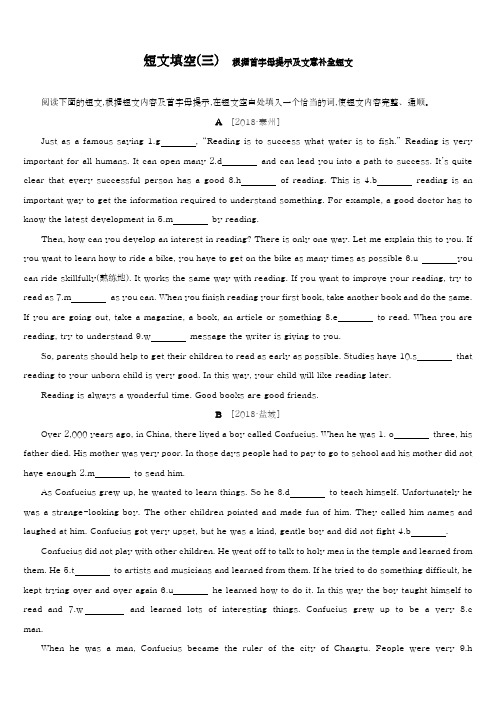
短文填空(三) 根据首字母提示及文意补全短文阅读下面的短文,根据短文内容及首字母提示,在短文空白处填入一个恰当的词,使短文内容完整、通顺。
A [2018·泰州]Just as a famous saying 1.g , “Reading is to success what water is to fish.”Reading is very important for all humans. It can open many 2.d and can lead you into a path to success. It’s quite clear that every successful person has a good 3.h of reading. This is 4.b reading is an important way to get the information required to understand something. For example, a good doctor has to know the latest development in 5.m by reading.Then, how can you develop an interest in reading? There is only one way. Let me explain this to you. If you want to learn how to ride a bike, you have to get on the bike as many times as possible 6.u you can ride skillfully(熟练地). It works the same way with reading. If you want to improve your reading, try to read as 7.m as you can. When you finish reading your first book, take another book and do the same. If you are going out, take a magazine, a book, an article or something 8.e to read. When you are reading, try to understand 9.w message the writer is giving to you.So, parents should help to get their children to read as early as possible. Studies have 10.s that reading to your unborn child is very good. In this way, your child will like reading later.Reading is always a wonderful time. Good books are good friends.B[2018·盐城]Over 2,000 years ago, in China, there lived a boy called Confucius. When he was 1. o three, his father died. His mother was very poor. In those days people had to pay to go to school and his mother did not have enough 2.m to send him.As Confucius grew up, he wanted to learn things. So he 3.d to teach himself. Unfortunately he was a strange-looking boy. The other children pointed and made fun of him. They called him names and laughed at him. Confucius got very upset, but he was a kind, gentle boy and did not fight 4.b .Confucius did not play with other children. He went off to talk to holy men in the temple and learned from them. He 5.t to artists and musicians and learned from them. If he tried to do something difficult, he kept trying over and over again 6.u he learned how to do it. In this way the boy taught himself to read and 7.w and learned lots of interesting things. Confucius grew up to be a very 8.c man.When he was a man, Confucius became the ruler of the city of Changtu. People were very 9.hwhen he was their leader. He used his abilities and skills in a 10.w way.People sometimes call him the greatest man who ever lived. We still remember many of his sayings today.C[2017·攀枝花]The Clever Learning MethodsWhy do you need study skills? Because they will make it 1.e for you to learn and do well in class, especially as you move up to middle school and high school.•Pay attention in classDo you have 2.d paying attention in class? Are you sitting next to a loud person? Is it hard to see the blackboard? Make sure you’re sitting in a good seat that makes you pay attention. Tell your teacher or parents about any problem that is stopping you from paying attention and taking good notes.•Take good notesNot sure how to take notes? Start by writing down facts that your teacher mentions 3.o writes on the blackboard in class. Try your best to use good handwriting so that you can read your notes later. It’s also a good idea to keep your notes, quizzes, and papers 4.o by subject.•Plan 5.b testsIt’s not wise of you to wait until 6.T night to study for Friday’s test. It also makes it hard to do your best. You’ll feel sorry for 7.p off things often. One of the best ways is to plan ahead.•Get a good night’s sleepSo the test is tomorrow and you’ve followed your study plan, but 8.s you can’t remember anything, not even 2+2! Don’t worry. Your brain needs time to digest(消化) all the 9.i you’ve given it. Try to get a good night’s sleep and you’ll be 10.s by what comes back to you in the morning!参考答案A 1.goes 2.doors 3.habit 4.because5.medicine6.until7.much8.else9.what 10.showed/shownB 1.only 2.money 3.decided 4.back5.talked6.until7.write8.clever9.happy 10.wiseC [主旨大意] 你需要一些学习技巧,特别是在初中或高中阶段。
四川省乐山市2017年中考英语真题试题(含答案)(真题)
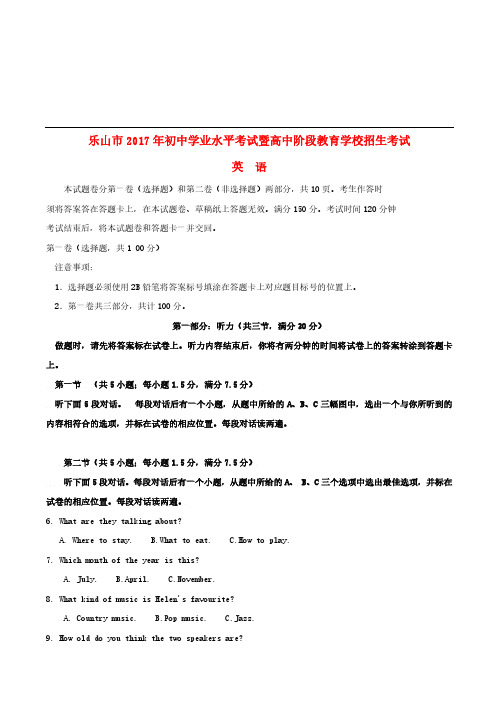
乐山市2017年初中学业水平考试暨高中阶段教育学校招生考试英 语本试题卷分第一卷(选择题)和第二卷(非选择题)两部分,共10页。
考生作答时须将答案答在答题卡上,在本试题卷、草稿纸上答题无效。
满分150分。
考试时间120分钟考试结束后,将本试题卷和答题卡一并交回。
第一卷(选择题,共1 00分)注意事项:1.选择题必须使用2B铅笔将答案标号填涂在答题卡上对应题目标号的位置上。
2.第一卷共三部分,共计100分。
第一部分:听力(共三节,满分30分)做题时,请先将答案标在试卷上。
听力内容结束后,你将有两分钟的时间将试卷上的答案转涂到答题卡上。
第一节 (共5小题;每小题1.5分,满分7.5分)听下面5段对话。
每段对话后有一个小题,从题中所给的A、B、C三幅图中,选出一个与你所听到的内容相符合的选项,并标在试卷的相应位置。
每段对话读两遍。
第二节(共5小题;每小题1.5分,满分7.5分)听下面5段对话。
每段对话后有一个小题,从题中所给的A、B、C三个选项中选出最佳选项,并标在试卷的相应位置。
每段对话读两遍。
6. What are they talking about?A. Where to stay.B.What to eat.C.How to play.7. Which month of the year is this?A. July.B.April.C.November.8. What kind of music is Helen's favourite?A. Country music.B.Pop music.C.Jazz.9. How old do you think the two speakers are?A. About sixty.B.About forty.C. About twenty.10. What does the woman want to know?A. How much money the man makes.B. What the man usually does after work.C. What the man does with most ofhis money.第三节(共10小题;每小题1.5分,满分15贫)听下面3段对话或独白。
- 1、下载文档前请自行甄别文档内容的完整性,平台不提供额外的编辑、内容补充、找答案等附加服务。
- 2、"仅部分预览"的文档,不可在线预览部分如存在完整性等问题,可反馈申请退款(可完整预览的文档不适用该条件!)。
- 3、如文档侵犯您的权益,请联系客服反馈,我们会尽快为您处理(人工客服工作时间:9:00-18:30)。
攀枝花2017年高中阶段教育学校招生统一考试·英语第Ⅰ卷(选择题,共三部分,满分95分)第一部分听力测试(20小题,满分20分)第一节(共5小题;每小题1分,满分5分)听句子,选择该句的最佳答语。
每个句子读一遍。
1.A.Thanks, I’m full. B.I want to have a rest. C. Yes, I’d like some noodles.2. A. She’s short and fat. B. She doesn’t like me. C. S he isn’t at home.3. A. Don’t ask me. B. Here you are. C. Turn right, and you’ll see it.4. A. I’m right. B. OK, Dad. C. Nice to meet you.5. A. She is from the US. B. She is an office clerk. C. She is beautiful.第二节(共15小题;每小题1分,满分15分)听下面5段对话。
每段对话后有几个小题,从题中所给的A、B、C三个选项中选出最佳选项,并标在试卷的相应位置。
听每段对话前,你将有时间阅读各个小题,每小题5秒钟。
听完后,各小题将给出5秒钟的作答时间。
每段对话读两遍。
听下面一段对话,回答第6和第7两个小题。
6.What does the man have?A. A bike.B. A car.C. A motorbike.7. What does the woman do twice a week?A. Go skating.B. Go swimming.C. Go boating.听下面一段对话,回答第8和第9两个小题。
8.What is Bob’s favorite subject?A. History.B. Biology.C. All the subjects.9. What does Rose often read at night?A. Books about plants and films.B. Books about plants and animals.C. Books about animals and living things.听下面一段对话,回答第10至第12三个小题。
10.Where did the man go in the summer vacation?A. He went back to his hometown.B. He went to Beijing.C. He went to Hainan.11. Why were the man’s grandparents happy to see him?A. Because they were very poor.B. Because they were very old now.C. Because they hadn’t seen him for a long time.12. Where did the man plant a young tree?A. In front of his old house.B. In the garden.C. In the field.听下面一段对话,回答第13至第16四个小题。
13.Why didn’t Jo yce go to school?A. Her mother was ill.B. She had a fever.C. She hurt her leg.14. How was the weather when Joyce was going home yesterday?A. Snowy.B. Rainy.C. Windy.15. How did she go home?A. By bus.B. By car.C.By bike.16. Who might Mr. Smith be?A. Her father.B.Her teacher.C.Her doctor.听下面一段独白,回答第17题至第20四个小题。
17.Why did Mr. Smith live in an old house alone?A. Because he liked to live by himself.B. Because he didn’t have his own family.C.Because he liked neither his wife nor his children.18. Who did Mr.Smith sometimes borrow money from?A. His workmates.B. The policeman.C.The taxi driver.19. How did Mr.Smith get home?A. By bus.B. By taxi.C. On foot.20. Why couldn’t Mr.Smith open his door by himself?A. He was drunk.B. The house was moving.C. He found the wrong do or第二部分基础知识运用。
(共两节,满分30分)第一节单项选择。
(共15小题;每题1分,满分15分)从各题所给的A、B、C、D四个选项中选出可以填入相应空白处的最佳选项,并将答题卡上相应的选项涂黑。
21.—You gave me a lot of help. Thank you.—.A. You’re welcomeB. Don’t thank meC. Don’t say soD. This is what I should do22. Would you please your MP3 a little? Your baby sister is sleeping.A. turn upB. turn downC.turn onD. turn in23. Could you tell me the beautiful mobile phone? I want to buy one, too.A. when did you buyB. when you boughtC. where you boughtD. where did you buy24. your umbrella, or you’ll catch a cold on such a rainy day.A. TakeB. To takeC. TakingD. Taken25. —Excuse me, whose bag is it? I found it in the waiting room.—Oh, it’s .Thanks.A. meB.myC. myselfD.mine26. —You can take subway to the museum.—No, I will go there by bike.A./; theB. the; /C. the ; theD.a; a27. —I think you are different now.—Of course, times have changed and .A. so have IB. so I haveC. neither have ID. neither I have28. —Shall we go now?—No, let’s wait the rain stops.A. untilB. whenC. ifD. as29. The woman is standing under the tree is my aunt.A.whatB. whichC.whoD.where30. Tom has decided a part-time job after he graduates from school.A.doB. to doC. didD.doing31. —Mum, I play the computer game for a while?—I’m afraid you have to finish your homework first.A. mustB. needC.willD.may32. He speaks English very well because he in the US for 20 years.A. livesB. livedC. has livedD.had lived33.—Which season do you like in Panzhihua, dry season or rainy season?—Rainy season.A. wellB. betterC. bestD. the best34. Look! This is our class photo. There 45 students in my class.A. hasB. haveC. isD. are35. My English teacher is always strict us.A. inB. atC. withD. about第二节完形填空。
(共15小题;每小题1分,满分15分)先通读下面两段短文,读懂大意,然后从后面各题所给的A、B、C、D四个选项中,选择可以填入相应空白处的最佳选项,并将答题卡上相应的选项涂黑。
AToday I was so happy to know that I did quite well in my last week’s science exam. Thanks to Daniel, he taught me a new way of 36 over lessons. It is called “map idea”.Because of the map idea, I’ve learned 37 to find out the main idea in every lesson. And in my mind I can 38 a map of all the important knowledge I need to remember. It’s really great. I can remember so much in that way.I had never thought about changing the way of study before. I always thought I had a39 memory, but now my memory has become better because of the map idea. It made my study much easier and more enjoyable. I know how to learn well is the most important 40 us students.36. A. go B. to go C. going D. gone37. A. how B. when C. where D. why38. A. find B. draw C. buy D. borrow39. A. good B. special C. common D. poor40. A. of B. for C. with D. inBOnce there was a lovely vegetable field with a very big tree in it. Both the vegetables and the tree made the garden look wonderful.In fact, the vegetables and the tree couldn’t get on well with41 . The vegetables disliked the tree because they thought the tree d idn’t leave them enough 42 by covering them with its thick leaves, while the tree thought that the vegetables drank nearly all the water before it could reach him.The situation became worse and worse. One day the vegetables decided to 43 all the water in the ground so that the tree would dry up. The tree fought back by refusing to offer the vegetables shade (树荫). Soon they both began to dry up under the hot sun.Neither of them expected that the gardener would stop 44 his vegetable field becausehe thought it was 45 to save the vegetables. When the gardener did that, the tree and the vegetables really felt how 46 they were. There seemed to be no way to solve the problem. Then a small pumpkin decided to do something to change the situation. The small pumpkin did all he could to grow 47 there was little water and it was too hot.Finally, the gardener 48 the growing pumpkin among the dying vegetables. 49 , he started to water the field again because he still wanted to make a (n) 50 to get the beautiful pumpkin. At the same time, the tree and the vegetables were saved. Since then, they realized that it was better to help each other than to fight, and they lived in harmony with other plants.41. A. other plants B. the gardener C. each other D. the pumpkin42. A. light B. water C. air D. wind43. A. look up B. use up C. pick up D. put up44. A. picking B. growing C. planting D. watering45. A. hopeless B. important C. hopeful D. necessary46. A. angry B. hungry C. thirsty D. comfortable47. A. so B. though C. but D. and48. A. watched B. knew C. harvested D. noticed49. A. Therefore B. However C. Besides D. Also50. A. decision B. idea C. effort D. chance第三部分阅读理解。
